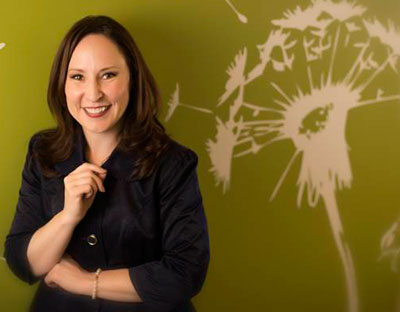Beth Torres, EMBA’11
CEO, Make-A-Wish Middle Tennessee
Career Path Milestones: Vice President, Junior Achievement Middle Tennessee and Account Marketing Manager, Reebok

As a teenage athlete, Beth Torres once dismissed the prospect of a business career as boring.
A job at Reebok after college was a huge turning point for the competitive gymnast. “Once I figured out business was competitive and I could figure it out, I wanted an MBA,” she says.
But it took a move into the nonprofit sector with Junior Achievement in Nashville to make business school a real option. Six months into a job with JA, Torres learned that Owen and the Center for Nonprofit Management offered a full scholarship to Vanderbilt’s Executive MBA program for a nonprofit executive. With her boss’s encouragement, she applied and in 2009, earned the scholarship.
Her appreciation for Owen was immediate and lasting, and it began with its faculty.
“Owen has unbelievable professors,” she says. “They’re engaged. They’re accessible. There isn’t much they taught that I’m not using, and they still answer our questions three years out. We were very lucky to have them.”
Making the move to CEO
She is as effusive about her fellow students, particularly her five-person study group.
“They are without question the people I call and bounce ideas off,” she says. She sought their counsel when she was offered the CEO position at Make-A-Wish Middle Tennessee in 2012. They helped her reach the decision to accept the role and she’s never looked back.
“I had that moment where you think, ‘How do I not do this?’” she says, of joining the organization that grants the wishes of children with life-threatening medical conditions. “Make-A-Wish is an amazing brand and at my first meeting with the board, I saw the vision they had for growth. I realized I would draft off that energy and leadership.”
She brought every bit of her competitive nature to bear on the position.
“The nonprofit sector and the traditional for-profit are not that different and they shouldn’t be,” she says. “Too often we’ve made exceptions for nonprofit, saying, ‘If we don’t reach as many people, if we don’t raise as much money, it’s okay. We tried really hard.’ That can’t be okay. If we miss on fundraising or on our mission, people don’t get served. We should be holding ourselves to higher, not lower, standards.”
The challenge of human capital
Leadership, she says, begins with resources—having the knowledge and manpower to succeed, something Owen facilitates.
“Too often we’ve made exceptions for nonprofit…That can’t be okay. If we miss on fundraising or on our mission, people don’t get served.”
“Someone in my office says, ‘We need this to be successful.’ Well, I know someone who runs a business, who may have access to that resource and I call somebody in the Owen network,” she says.
The biggest challenge, she says, is human capital. “Leadership involves keeping people motivated, inspired and engaged. Can I teach my staff to lead each other? If I have to go in every day and I’m the only cheerleader, it doesn’t work,” she says. “But if they can lean on each other and help each other succeed, the results are unbelievable.”
She also wants to see in them the adventurous spirit she brings to the table.
“In the culture we’re building, it’s okay to make a mistake,” she says. “It’s not okay to do nothing. I’d rather try something new and if it fails, we don’t do that again. If it works, how do we build on it?”
Preparation, she says, should begin with the individual.
“For me,” she says, “college was about the things I could try, organizations I could join. That’s where you learn about networking and about contributing.”
Prepared to make important decisions
She sees Owen as another rich opportunity.
“The onus is on the student. It’s our responsibility to meet as many people as possible—classmates, professors and administration. This is the chance to pick their brains,” she says. “If you’ve been a true student, by the time you hit a leadership role, you can trust your gut.
“I had good business instincts before Owen, but Owen gave me the language to communicate. If something didn’t make sense, I learned to ask questions immediately—where I may have waited before. Owen gives you that. You’re in a room with 50 of the smartest people you’ve ever met and they’re asking questions. If they’re asking them, I have no excuse. I can admit what I don’t know.”
Just as in athletics, setbacks can be key to development.
“If I’d been told how tough that first year as CEO would be, I don’t know if I would have signed up,” she says. “But if I hadn’t had those challenges the first year, I wouldn’t love it as much today. Owen prepared me to make important decisions.”

Leave a Reply